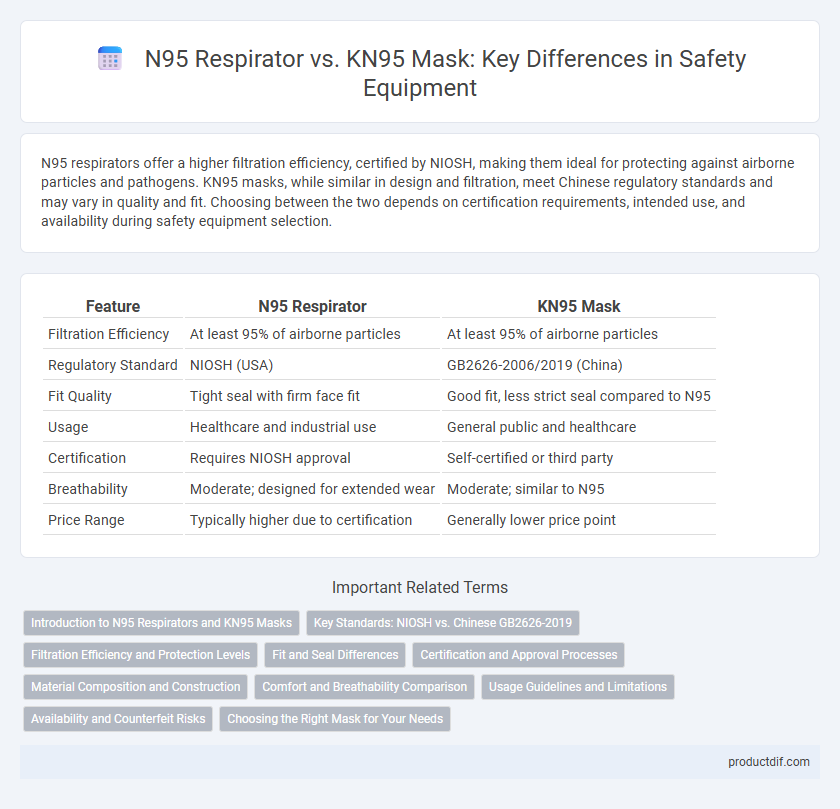N95 respirators offer a higher filtration efficiency, certified by NIOSH, making them ideal for protecting against airborne particles and pathogens. KN95 masks, while similar in design and filtration, meet Chinese regulatory standards and may vary in quality and fit. Choosing between the two depends on certification requirements, intended use, and availability during safety equipment selection.
Table of Comparison
| Feature | N95 Respirator | KN95 Mask |
|---|---|---|
| Filtration Efficiency | At least 95% of airborne particles | At least 95% of airborne particles |
| Regulatory Standard | NIOSH (USA) | GB2626-2006/2019 (China) |
| Fit Quality | Tight seal with firm face fit | Good fit, less strict seal compared to N95 |
| Usage | Healthcare and industrial use | General public and healthcare |
| Certification | Requires NIOSH approval | Self-certified or third party |
| Breathability | Moderate; designed for extended wear | Moderate; similar to N95 |
| Price Range | Typically higher due to certification | Generally lower price point |
Introduction to N95 Respirators and KN95 Masks
N95 respirators are certified by the National Institute for Occupational Safety and Health (NIOSH) and offer a filtration efficiency of at least 95% against airborne particles. KN95 masks, adhering to Chinese standards, provide a similar filtration level but differ in design and fit requirements. Both types are crucial in respiratory protection, but N95 respirators undergo more rigorous testing and certification processes for medical and industrial use.
Key Standards: NIOSH vs. Chinese GB2626-2019
N95 respirators are certified by NIOSH, meeting stringent U.S. standards for filtering at least 95% of airborne particles, including non-oil aerosols. KN95 masks adhere to the Chinese GB2626-2019 standard, offering similar filtration efficiency but differing in testing protocols and fit requirements. Understanding NIOSH certification versus GB2626-2019 compliance is crucial for selecting effective respiratory protection in various safety environments.
Filtration Efficiency and Protection Levels
N95 respirators are certified by NIOSH to filter at least 95% of airborne particles, including pathogens and fine dust, ensuring a high protection level in healthcare and industrial settings. KN95 masks, meeting Chinese standards, also claim 95% filtration efficiency but often vary in fit and certification rigor, potentially affecting their protective performance. The N95's stringent testing protocols generally provide superior filtration reliability, making it the preferred choice for critical safety applications.
Fit and Seal Differences
N95 respirators provide a tighter fit and superior seal compared to KN95 masks, effectively minimizing airborne particle infiltration. The N95 is designed with adjustable nose clips and headbands that enhance the seal, whereas KN95 masks typically use ear loops, which can compromise fit. Proper sealing in N95 respirators is critical for achieving the required filtration efficiency of at least 95% against airborne contaminants.
Certification and Approval Processes
N95 respirators are certified by the National Institute for Occupational Safety and Health (NIOSH) in the United States, ensuring rigorous testing and approval based on filtration efficiency and breathability standards. KN95 masks comply with the Chinese GB2626-2006 standard, which mandates similar filtration criteria but follows distinct certification procedures. Both certifications verify the mask's ability to filter at least 95% of airborne particles, but the NIOSH approval process is often considered more stringent due to comprehensive manufacturing and quality control assessments.
Material Composition and Construction
N95 respirators utilize multiple layers of non-woven polypropylene fabric with electrostatically charged fibers that enhance particle filtration efficiency, offering at least 95% filtration of airborne particles as certified by NIOSH. KN95 masks, designed according to Chinese standards, also use non-woven polypropylene layers but may vary in electrostatic charge quality and layer density, impacting overall filtration performance. The construction of N95 respirators typically includes a tighter fit and higher filtration consistency due to stringent regulatory testing, whereas KN95 masks often provide comparable material composition but with less rigorous fit testing protocols.
Comfort and Breathability Comparison
N95 respirators provide a tighter seal and higher filtration efficiency but may cause more discomfort and heat buildup during extended wear. KN95 masks offer slightly looser fit, enhancing breathability and making them more comfortable for prolonged use in less hazardous environments. Both types are designed to reduce airborne particles, but the choice depends on balancing protection levels with wearer comfort and breathability.
Usage Guidelines and Limitations
N95 respirators are certified by NIOSH and designed for healthcare settings, providing a higher filtration efficiency of 95% against airborne particles, while KN95 masks meet Chinese standards with similar filtration but less consistent quality control. N95 masks require fit testing and are intended for single use to ensure optimal protection, whereas KN95 masks may vary in fit and are generally recommended for non-medical use or as a public protective measure. Both masks should be discarded after exposure to contaminants or moisture, as reusing or improper fitting compromises their effectiveness in preventing respiratory infections.
Availability and Counterfeit Risks
N95 respirators are regulated by NIOSH and often have more reliable availability through certified suppliers, reducing the risk of counterfeit products. KN95 masks, while meeting similar filtration standards, are manufactured internationally with less stringent oversight, increasing counterfeit prevalence and challenges in verifying authenticity. Consumers should prioritize purchasing from reputable sources and check certification labels to ensure genuine protective equipment.
Choosing the Right Mask for Your Needs
N95 respirators provide a higher filtration efficiency of at least 95% against airborne particles and are certified by the National Institute for Occupational Safety and Health (NIOSH), making them ideal for healthcare and high-risk environments. KN95 masks, meeting Chinese standards, offer similar filtration but may have variable quality and certification, suitable for general public use and lower-risk settings. Selecting the right mask depends on factors such as certification authenticity, intended protection level, and regulatory compliance for optimal safety.
N95 respirator vs KN95 mask Infographic

 productdif.com
productdif.com